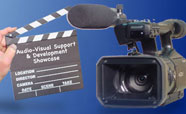704 audio and video podcasts found.

Why Study Humanities? "I like it and it's important Aunty!"
Professor Jon Hall, Classics, gives the graduation address at the Arts, Music and Theology graduation ceremony on 14 December 2016.

CTPI: Why Theology Matters to Tree Frogs
A Public Lecture with Rev. Peter Harris, Anglican Minister, Conservationist, and Co-Founder of Christian Conservation Organisation A Rocha. 24 November 2016

CTPI & NCPACS: World Council of Churches' Response to Religious Violence
Rev. Dr Olav Fykse Tveit addresses the World Council of Churches Central Committee's recent 'Statement on Religion and Violence' (28 June 2016), which addresses the persistence and spread of extremist violence in the world, and its ambiguous connections with religion. 7 October 2016.

Archibald Baxter Memorial Lecture: The politics of compassion in a world of ruthless power
Professor Kevin Clements delivers the 2016 Archibald Baxter Memorial Lecture. 28 September 2016

IPL: Planning biodiverse cities for all ages
As an environmental planner, Claire Freeman's research focuses on the intersection of the natural and built environment. She examines how environmental relationships can be enhanced through more effective planning policy, design and practice. In particular, she looks at how planning can help create urban environments that work better for children and young people, and for nature. It links across three major disciplinary fields; the social sciences, biological science and planning. Some current and recent projects she is involved with are: “Natural neighbourhoods for city children”, a Marsden-funded study exploring how children in Dunedin, Auckland and Wellington connect with nature in their daily lives; “the Dunedin Garden Study,” which investigates householders' relationships with native biodiversity in their gardens; “Children and young people's experiences following the Christchurch earthquake”; and a study of “Children's experiences of neighbourhood” in New Zealand, Fiji and Kiribati. 20 September 2016

IPL: Toitū te Whenua, Toitū te Mana
In this Inaugural Professorial Lecture, Professor Jacinta Ruru anchors her research journey within this Māori proverb to help bring alive the endurance and 'foreverness' of the Māori world in Aotearoa. Professor Ruru shares the ways in which she has sought to contribute towards challenging the law to more respectfully recognise and embrace Indigenous peoples' authority, laws, values, rights and responsibilities to own, govern and manage land and water. 12 September 2016

Theology and Religion: Towards an Ecumenical Political Theology: Charisms Catholic, Reformed and Anabaptist
Rev Dr Doug Gay is the Stuart Residence Halls Council Distinguished Visitor for 2016. In this public lecture, he traces the outline of an ecumenical political theology incorporating the Catholic, Reformed and Anabaptist traditions of narrative, discipline and witness, with particular reference to the political and economic environment and events leading to the post 2008 economic crisis. 6 September 2016.

National Centre for Peace and Conflict Studies: Adam Curle Radical Peacemaker
Professor Kevin Clements gives a recorded presentation to the Adam Curle Symposium held at the University of Bradford

Peace Lecture 2016: Between Law and Spirituality – Islam's legal basis for its spirit of peaceful coexistence
Imam Afroz Ali is the founder and president of Al-Ghazzali Centre for Islamic Sciences & Human Development in Sydney, Australia, and an Australian Ambassador for the Charter of Compassion. He is also is a founding member of the Australian Religious Response to Climate Change and served as managing director for SeekersHub Global. This is the 13th annual peace lecture, organised by the Otago Tertiary Chaplaincy and the Dunedin Abrahamic Interfaith Group. 24 August 2016

Thomas Burns Memorial Lectures 2016: Professor Choon-Leong Seow - The Story of Job: A contested classic 6
The Department of Theology and Religion presents lecture three of the 2016 Thomas Burns Memorial Lecture series. Given by Professor Choon-Leong Seow, Vanderbilt Divinity School, this presentation covers the topic 'Job in Modern Literature'. 4 August 2016

Faculty of Law: Professor Graham Virgo - Conscience in Equity: a new Utopia
The Faculty of Law presents this public lecture by Professor Graham Virgo, 2016 NZ Law Foundation Distinguished Visiting Fellow, 2016 FW Guest Memorial Lecturer. In 1516 Sir Thomas More published 'Utopia', which identifies an attractive vision of law and society. As Lord Chancellor, More helped to develop Equity as a mechanism to secure justice which was not provided through the rigid interpretation of the Common Law. From the start, the equitable jurisdiction was founded on conscience. By tracing the historical development of conscience it is possible to identify the theoretical structure which justifies and explains the equitable jurisdiction and shows how it should develop in the future.

Thomas Burns Memorial Lectures 2016: Professor Choon-Leong Seow - The Story of Job: A contested classic 5
The Department of Theology and Religion presents lecture three of the 2016 Thomas Burns Memorial Lecture series. Given by Professor Choon-Leong Seow, Vanderbilt Divinity School, this presentation covers the topic 'Job Through the Eyes of Artists'. 3 August 2016

IPL: Dealing with Difference: Responses to uneven geographical development
Professor Etienne Nel of the Department of Geography, delivers his Inaugural Professorial Lecture: “Dealing with Difference: Responses to uneven geographical development”. Etienne has authored, co-authored or edited 10 books, and has written nearly 30 book chapters and more than 100 articles, primarily on economic development in Africa. 2 August 2016

Thomas Burns Memorial Lectures 2016: Professor Choon-Leong Seow - The Story of Job: A contested classic 4
The Department of Theology and Religion presents lecture three of the 2016 Thomas Burns Memorial Lecture series. Given by Professor Choon-Leong Seow, Vanderbilt Divinity School, this presentation covers the topic 'Job as a Contested Classic'. 2 August 2016
12345678910111213141516171819202122232425262728Next
